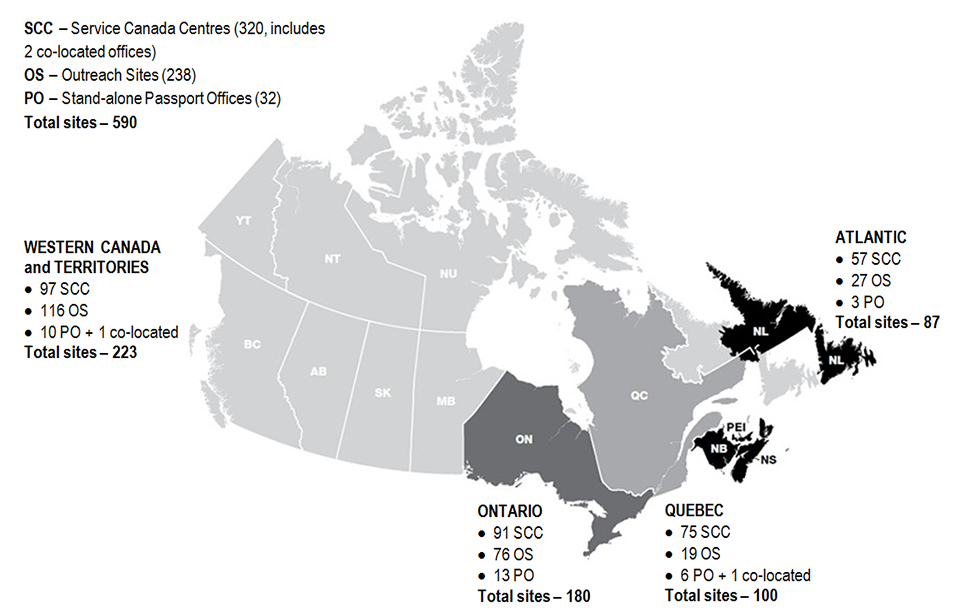Raison d’être, mandate and role: who we are and what we do
From Employment and Social Development Canada
Official title: Employment and Social Development Canada 2016–2017 Departmental Results Report
Raison d’être
The mission of Employment and Social Development Canada (ESDC), including the Labour Program and Service Canada, is to build a stronger and more inclusive Canada, to support Canadians in helping them live productive and rewarding lives and to improve Canadians’ quality of life.
Mandate and role
ESDC delivers a range of programs and services that affect Canadians throughout their lives. The Department provides seniors with basic income security, supports unemployed workers, helps students finance their post-secondary education and assists parents who are raising young children. The Labour Program contributes to social and economic well-being by fostering safe, healthy, fair and inclusive work environments and cooperative workplace relations in the federal jurisdiction. Service Canada engages millions of Canadians each year to provide a range of government services and information either online, by phone or in person.
To fulfill its mission, the Department is responsible for:
- developing policies that ensure all can use their talents, skills and resources to participate in learning, work and their community;
- delivering programs that help Canadians move through life’s transitions, from school to work, from one job to another, from unemployment to employment and from the workforce to retirement;
- providing income support to seniors, families with children and Employment Insurance beneficiaries;
- fostering inclusive growth by providing opportunity and assistance to Canadians with distinct needs, such as Indigenous people, people with disabilities, homeless people and recent immigrants;
- overseeing labour relations, occupational health and safety, labour standards, employment equity and workers’ compensation in the federal jurisdiction; and
- delivering programs and services for other departments and agencies, such as Passport services delivered on behalf of Immigration, Refugees and Citizenship Canada and services to veterans delivered for Veterans Affairs Canada.
Included in these core roles are responsibilities for the design and delivery of some well-known Government of Canada programs and services:
- Old Age Security;
- the Canada Pension Plan;
- Employment Insurance;
- the Canada Student Loans and Grants and Canada Apprentice Loans Program;
- the Canada Education Savings Program;
- the Wage Earner Protection Program; and
- Passport services.
Direct benefits to Canadians are part of Canada’s social safety net and represent 95 percent of the Department’s expenditures.
Through the Labour Program, the Department contributes to the well-being of working Canadians by providing labour relations mediation services, enforcing minimum working conditions, promoting decent work and fostering respect for international labour standards.
Through Service Canada, the Department helps Canadians access departmental programs as well as other Government of Canada programs and services at 590 in-person points of service across the country (558 Service Canada points of service, 2 consolidated offices with a Passport Office and 32 stand-alone Passport Offices). In addition to in-person services, the organization also serves the needs of Canadians online at Canada.ca, through My Service Canada Account and by telephone through 1 800 O-Canada and its network of call centres.

Text description of figure 1
Map of Canada that shows 590 in person points of service across the country.
- 320 Service Canada Centres includes 2 co-located offices
- 238 Outreach sites
- 32 stand-alone Passport Offices
- 590 total sites
Western Canada and territories
- 97 Service Canada Centres
- 116 Outreach sites
- 10 stand-alone Passport Offices + 1 co-located
- Total sites: 223
Ontario
- 91 Service Canada Centres
- 76 Outreach sites
- 13 stand-alone Passport Offices
- Total sites: 180
Quebec
- 75 Service Canada Centres
- 19 Outreach sites
- 6 stand-alone Passport Offices + 1 co-located
- Total sites: 100
Atlantic
- 57 Service Canada Centres
- 27 Outreach sites
- 3 stand-alone Passport Offices
- Total sites: 87
Finally, through its grants and contributions programs, the Department provides funding to other orders of government and organizations in the voluntary and private sectors, educators and community organizations to support projects that meet the labour market and social development needs of Canadians.
For more general information about the Department, see the “Supplementary Information” section of this report.
For more information on organizational priorities, see the Ministers’ mandate lettersFootnote 1 on the Prime Minister of Canada’s website.